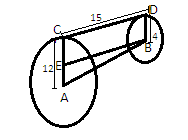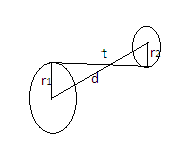Question
Question: The length of common tangent to the circle of radii \(12\)cm and \(4\)cm is \(15\) cm. The distance ...
The length of common tangent to the circle of radii 12cm and 4cm is 15 cm. The distance between their centers is 17cm.
A) True B) False
Solution
We can solve the problem by using pythagoras theorem by making figure on given conditions or we can also solve using the formula d = t2+(r1−r2)2 where d is the distance between the centers of two circles with radii r1 and r2, and t is the length of the common tangent. On putting the given values, you’ll get the answer.
Complete step by step answer:
Given, the length of common tangent to the circles = 15cm and the radii of the two circles are 12cm and 4cm. We have to find the distance between their centers. Let A and B be the centers of the two circles respectively and CD be the common tangent to the circles. Let us draw EB ∥CD to make rectangle BDCE where CD=EB=15cm and EC=BD= 4cm

Now from the figure, AE=AC-CE
⇒AE = 12 - 4 = 8 cm

Now In the triangle BEA, We know EB and AE but we have to find AB.
Let AB=x cm. Since ∆ BEA is a right-angled triangle, we can use the Pythagoras theorem to find AB. According to the Pythagoras theorem, “In a right-angled triangle, the square of the hypotenuse side is equal to the sum of squares of the other two sides.”It can be written as-
⇒ H2=P2 + B2
Where H is the hypotenuse, P is the perpendicular and B is the base of the triangle.
In triangle BEA, H=AB, P=EB and B=AE
Then on using the formula, we get
⇒ (AE)2+(EB)2=AB2
⇒x2=(8)2+(15)2=64+225=289 ⇒x=289=17
AB=17 cm= the distance between the centers of the two circles. So the statement is true.
Hence the correct answer is ‘A’.
Note: : We can also use the formula d = t2+(r1−r2)2 where d is the distance between the centers of two circles with radii r1 andr2, and t is the length of the common tangent and we’ll get the same answer. This formula is used when the circles have a direct common tangent. On putting the given values we get,
⇒ d=152+(12−4)2=225+82=225+64
⇒ d=289=17 cm
But If the circles have transverse common tangent (see the figure)-

Then we use formula for distance between their centers d = t2+(r1 + r2)2 where the notations have same meaning.
